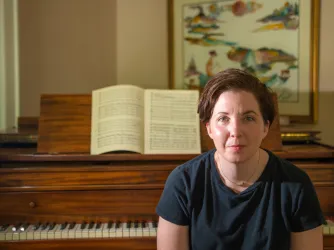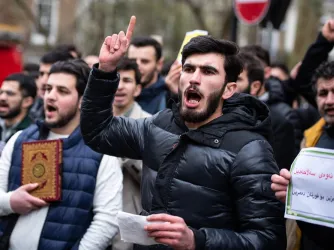Table of Contents
FIRE Campus Scholar holds free speech debates at William & Mary

PT Hamilton / Shutterstock.com
Grishma Baruah a rising junior at the College of William and Mary and is a FIRE Campus Scholar.
This past January, I received the opportunity to become a Campus Scholar for the Foundation for Individual Rights and Expression, which works to defend and promote free speech and other civil liberties on college campuses across the country. As a Campus Scholar, I got to be part of FIRE’s work when I was given a grant to create a project related to free speech at my college.
As a sophomore at the College of William & Mary double majoring in computer science and finance, I hope to one day have a career where I can intertwine my various academic passions with my love for leadership and communication. Though people might not immediately think my majors are associated with free speech, I have always been interested in the topic, especially as it applies to Artificial Intelligence, data usage, and privacy.
In developing my FIRE Campus Scholar project proposal, I knew I wanted to do something that involved debate. I debated at the national level in high school, and, in college, I joined William & Mary’s debate society, for which I serve as vice president of education. I also wanted to keep in mind the environment at my campus: William and Mary is known to have a strong political presence and an overall passion for advocacy, and is one of FIRE’s highest ranked schools in its Free Speech Rankings.

FIRE’s Campus Scholars bring free speech culture to campus
Last year, we set out to empower the best and brightest student advocates for free speech by launching the Campus Scholars program.
After some brainstorming and attending FIRE’s Campus Scholars weekend training in the Philadelphia office, I finalized a project through which students could debate big ideas, fostering free speech on William & Mary’s campus.
My project this semester was to hold monthly debates on-campus centered around topics related to free speech and academic freedom. I organized weekly practices to lecture on a debate-related topic to all members and then arranged practice rounds related to the week’s lecture. I was inspired to use my experience organizing debates to hold larger-level ones for the FIRE Campus Scholars project.
To have a broad outreach for the monthly debates, I involved members of my debate team and a range of political and advocacy organizations such as Young Democrats, Young Independents, and the International Relations Club, all with the goal of creating a space with diverse perspectives and unique views.
Debate topics included the effectiveness of a liberal arts curriculum, such as the one at William & Mary, in fostering academic freedom; the presence of non-student, controversial groups on campus; and methods to promote free speech from a young age.
Each debate had an attendance of around 40 students, both from the debate team and other organizations. At the start of each event, I gave a quick overview lecture on free speech and the topic we would be discussing. I also went over brief guidelines of how debates work, based on the format for the monthly event: either town hall discussion or two vs. two parliamentary-style debate.
During the debates, I noticed how the conversations started off surface-level, but soon became incredibly nuanced and impactful. Students expressed their differing views and had respectful, meaningful conversations that led to a deep-dive into their thoughts and reasoning. I noticed how some students even shifted their perspectives from beginning to end, realizing the importance of discussion and debate in becoming better educated and open to new ideas. I also saw how some students were quiet near the beginning, but over the 1.5 hour debates, became more comfortable sharing their perspectives. The productive conversations and the contrasting opinions, respectfully expressed, showed me that these debates were a success.
At the end of all of the debates, I wanted a way to represent the diversity in perspective and the productive discussion that took place. I gave each participant a notecard and asked them a question related to the topic of the debate and then put together all of the notecards for each event. Below are some of the responses from the first debate, where we discussed liberal arts education and academic freedom. At the end of the debate, I asked everyone what comes to mind, in a word or two, when they hear liberal arts and free speech. Each participant wrote their immediate thoughts on a notecard.

Looking at each poster and the many responses, I noticed how people had varying views yet came together to have a respectful, meaningful, educational discussion — a true representation of the power of free speech. Being part of each debate and seeing the note cards made me feel incredibly proud.
I am so grateful to have had the opportunity to make an impact on William & Mary’s campus through FIRE.
Recent Articles
FIRE’s award-winning Newsdesk covers the free speech news you need to stay informed.

Federal court backs teachers fired over trans protest

Speak up, get expelled: the Eastman way

University of Rochester student expelled after detailing school's mishandling of harassment complaint on Substack


